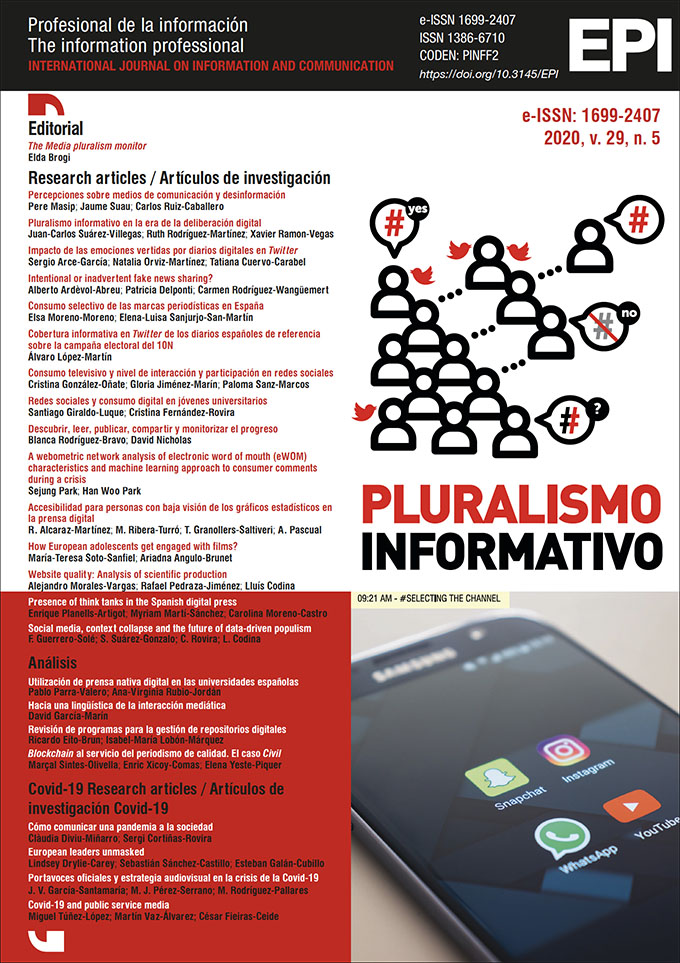Toward a linguistics of media interaction. Design of meaningful user participation from independent podcasting
DOI:
https://doi.org/10.3145/epi.2020.sep.05Keywords:
Podcasting, Interaction, Participation, Transmedia, Media Theory, Digital audio, Media evolution, Citizen media, Media ecosystem, PlatformsAbstract
In 2004, José Antonio Gelado introduced podcasting into Spain after an intense period of experimentation based on the work carried out by the pioneers of the medium in the USA. In the Spanish context, podcasting is an example of a digital medium essentially promoted by a community of independent and non-professional creators, without any prior connection to the communication field. Numerous and relevant voices have defended that the emergence of new media such as podcasts is building a new media ecosystem characterized by the decentralization and democratization of agenda-setting. For this reason, this research focuses on the real possibilities for citizen participation in this medium. The fieldwork was based on a mixed-methods research design integrating an analysis of the most relevant podcast rankings in Spain, a total of 22 in-depth interviews with users and podcasters, analysis of the spaces for participation in the medium, and non-participatory observation practiced on the Spanish podcastphere. In contrast to the certainly celebratory claims that defend that the Internet, and more specifically digital platforms, give a voice to those who do not have the opportunity to participate in traditional mass media, our results determine that in most cases such participation is not sufficient for ordinary citizens to be empowered in a real manner, due to the multiple barriers that both media and digital platforms continue to represent. Finally, we propose a preliminary theory of media interaction taking into consideration seven key concepts: neobroadcasting, technology, ecosystem, grammar, cartography, interoperability, and evolution
Downloads
References
Aparici, Roberto; Silva, Marco (2012). "Pedagogía de la interactividad". Comunicar, v. 19, n. 38, pp. 51-58. https://doi.org/10.3916/C38-2012-02-05
Atton, Chris (2001). Alternative media. London: SAGE Publications. ISBN: 978 0 761967705
Barrios-O´Neill, Danielle (2018). "Wild listening: Ecology of a science podcast in podcasting". In: Llinares, Darío; Fox, Niel; Berry, Richard. Podcasting. New aural cultures and digital media. Cham, Switzerland: Palgrave Macmillan, pp. 141-172. ISBN: 978 3 319 90055 1
Benkler, Yochai (2006). The wealth of networks. London: Yale University Press. ISBN: 978 0 300125771
Berry, Richard (2018). "Just because you play a guitar and are from Nashville doesn"˜t mean you are a country singer: The emergence of medium identities in podcasting". In: Llinares, Darío; Fox, Niel; Berry, Richard. Podcasting. New aural cultures and digital media. Cham, Switzerland: Palgrave Macmillan, pp. 15-33. ISBN: 978 3 319 90055 1
Fuchs, Christian (2020). Cuture and economy in the age of social media. New York: Routledge. ISBN: 978 1 138 83929 8
García-Marín, David (2016). Podcasting y transmedia: el transcasting. http://e-spacio.uned.es/fez/eserv/bibliuned:masterComEdred-Dgarcia/Garcia_Marin_David_TFM.pdf
García-Marín, David (2017). "La nueva comunicación sonora. Del podcast al transcasting". En: Aparici, Roberto; García-Marín, David. ¡Sonríe, te están puntuando! Narrativa digital interactiva en la era de Black Mirror. Barcelona: Gedisa, pp. 145-164. ISBN: 978 84 16919 73 4
García-Marín, David (2019). "La radio en pijama. Origen, evolución y ecosistema del podcasting español". Estudios sobre el mensaje periodístico, v. 25, n. 1, pp. 181-196. https://doi.org/10.5209/ESMP.63723
García-Marín, David (2020). "Mapping the factors that determine engagement in podcasting: design from the users and podcasters´ experience". Communication & society, v. 33, n. 2, pp. 49-63. https://doi.org/10.15581/003.33.2.49-63
iVoox (2009). El ranking y contabilización de descargas em iVoox. http://www.ivoox.com/blog/el-ranking-y-contabilizacion-de-descargas-en-ivoox_0032
Jenkins, Henry (2008). Convergence culture. La cultura de la convergencia en los medios de comunicación. Barcelona: Paidós. ISBN: 978 84 49321535
Maeda, John (2006). The laws of simplicity. Design, technology, business, life. Cambridge, Massachusetts: The MIT Press. ISBN: 978 0 262 13472 9
Pariser, Eli (2011). The filter bubble. London: Penguin. ISBN: 978 0 143121237
Prior, Markus (2007). Post-broadcast democracy. Cambridge, UK: Cambridge University Press. ISBN: 978 1 139878425
Rosen, Jay (2006). The people formerly known as the audience. That´s what I call them. http:// archive.pressthink.org/2006/06/27/ppl_frmr.html.
Scolari, Carlos (2018). Las leyes de la interfaz. Diseño, ecología, evolución, tecnología. Barcelona: Gedisa. ISBN: 978 84 16919 93 2
Spinelli, Martin; Dann, Lance (2019). Podcasting. The audio media revolution. London: Bloomsbury Academic. ISBN: 978 1 5013 2869 5
Sunstein, Cass (2009). Republic.com 2.0. Princeton, New Jersey: Princeton University Press. ISBN: 978 0 691143286
Turow, Joseph (2011). The daily you. How the new advertising industry is defining your identity and your worth. London: Yale University Press. ISBN: 978 0 300 16652 1
Downloads
Published
How to Cite
Issue
Section
License
Dissemination conditions of the articles once they are published
Authors can freely disseminate their articles on websites, social networks and repositories
However, the following conditions must be respected:
- Only the editorial version should be made public. Please do not publish preprints, postprints or proofs.
- Along with this copy, a specific mention of the publication in which the text has appeared must be included, also adding a clickable link to the URL: http://www.profesionaldelainformacion.com
- Only the final editorial version should be made public. Please do not publish preprints, postprints or proofs.
- Along with that copy, a specific mention of the publication in which the text has appeared must be included, also adding a clickable link to the URL: http://revista.profesionaldelainformacion.com
Profesional de la información journal offers the articles in open access with a Creative Commons BY license.




